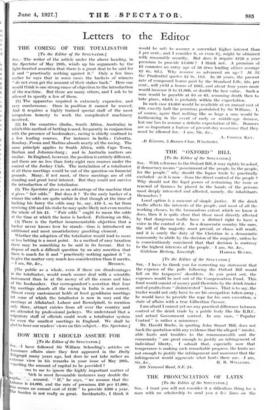Letters to the Editor
THE COMING OF. THE TOTALISATOR [To the Editor of the SPECTATOR.] Sin,—The writer of the article under the above heading, in the Spectator of May 28th, winds up his arguments by the light-hearted assertion that there is a great deal to be said for it and " practically nothing against it." Only a few lines earlier he says that in some cases the backers of winners " do not even get the amount of their stakes back." Here one would think is one strong cause of objection to the introduction of the machine. But there are many others, and I ask to be allowed to specify a few of them.
(1) The apparatus required is extremely expensive, and very cumbersome. Once in position it cannot be moved. And it requires a highly trained special staff of the most scrupulous honesty to work the complicated machinery involved.
(2) In the countries (India, South Africa, Australia) in which this method of betting is used, frequently in conjunction with the presence of bookmakers, racing is chiefly confined to a few leading courses. For instance in India : Calcutta, Bombay, Poona and Madras absorb nearly all the racing. The same principle applies to South Africa, with Cape Town, Durban and Johannesburg ; and in Australia matters arc similar. In England, however, the position is entirely different, and there are no less than forty-eight race courses under the control of the Jockey Club. The installation of a totalisator at all these meetings would be out of the question on financial grounds. Many, if not most, of these meetings are of old standing and great local interest. But they could not survive the introduction of the totalisator.
(3) The Spectator gives as an advantage of the machine that it gives " fair odds." But does it ? To the early backer of a winner the odds are quite unfair in that though at the time of backing his fancy the cdds may be, say, £10-1, so far from receiving £10 and his stake he may quite likely not even receive the whole of his £1. " Fair odds " ought to mean the odds at the time at which the horse is backed. Following on this,
(4) There is the further insurmountable objection that a backer never knows how lie stands—thus is introduced an additional and most unsatisfactory gambling element.
Whether the adoption of the totalisator would lead to more or less betting is a moot point. As a method of easy taxation there may be something to be said in its favour. But to dispose of such a difficult question by an airy assertion that there is much for it and " practically nothing against it " is to give the matter very much less consideration than it merits.
[The public as a whole, even if there are disadvantages in the totalisator, would much sooner deal with a scientific instrument than be at the mercy of all the errors and bias of the bookmaker. Our correspondent's assertion that four big meetings absorb all the racing in India is not correct. Almost every cantonment holds at least gymkhana meetings (at some of which the "totalisator is now in use) and the meetings at Allalialiad," Lahore and Rawalpindi, to mention only three, attract entries from all over the country and arc attended by professional jockeys. We understand that a migratory staff of officials could work a totalisator system for even the smallest meetings in England. We shall be glad to hear our readers' views on this subject.—Eb. Spectator.]






































 Previous page
Previous page